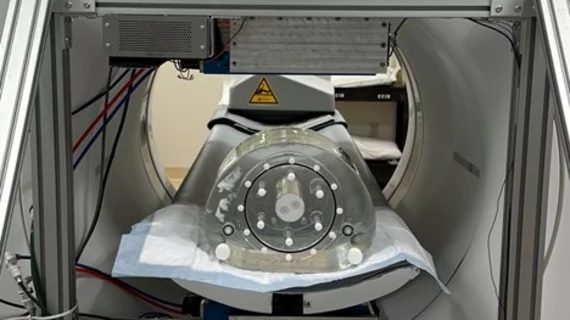New PET technology offers 'clear improvement' of whole-body scan resolution
New cost-effective PET scanning technology offers improved image resolution for whole-body scans and could be especially beneficial to cancer patients.
Augmented whole-body scanning via magnifying PET (AWSM-PET) was unveiled over the weekend during the 2023 Society of Nuclear Medicine and Molecular Imaging Annual Meeting. The new technology is said to enhance image resolution and system sensitivity of whole-body PET imaging.
It achieves this by way of two add-on “outsert” detectors that simultaneously scan patients during their whole-body PET exam. These detectors are placed outside of the scanner’s axial imaging field to capture high resolution PET data while also utilizing customized firmware and software that jointly reconstruct the data.
The new technology could be especially beneficial in the realm of cancer staging and restaging, as it improves diagnostic accuracy in smaller lesions, explained Yuan-Chuan Tai, PhD, associate professor of radiology at Washington University in St. Louis, Missouri.
“Our novel AWSM-PET prototype helps to tackle two of the key limitations in whole-body PET imaging: image resolution and overall system sensitivity,” Tai said.
Tai and colleagues tested the prototype on a cylindrical phantom with small lesions ranging from 1.96 mm to 7.6 mm in diameter. Through this, the team observed a “clear improvement in image resolution from the AWSM-PET device.”
“The high-resolution outsert detectors exhibit excellent spatial, energy and timing resolution,” Tai noted, adding that the custom firmware and software also were validated.
As the group continues to optimize the whole-body imaging protocol to best suit AWSM-PET, plans to compare the new technology’s utility to that of standard FDG whole-body PET/CT in humans are underway, with a clinical trial set to begin this summer at the Washington University School of Medicine in St. Louis.
The study abstract is available here.

